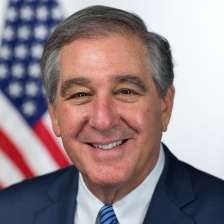BY QUIN WELCH, EDITOR-IN-CHIEF
Bellarmine University recently announced the hiring of Jerry Abramson as an executive-in-residence. The former Louisville mayor, Kentucky lieutenant governor and director of intergovernmental affairs for the Obama administration will teach courses on leadership and civics. Abramson will also develop a new institute for local government officials from coast to coast to train and develop their leadership abilities. He sat down with The Concord for a Q&A. This is the second part of a two-part series. To read Part I, visit KnightsMediaNetwork.com.
QW: Coming from the White House to Bellarmine is quite a change. What do you hope to bring to Bellarmine with your experience?
JA: This semester, I’m going to make myself available to give lectures to any and all classes where the faculty will invite me to attend. In the fall, I hope to start teaching courses on leadership, courses on metropolitan communities and the issues facing them and their futures.
This semester, I hope to work with the National League of Cities and the National Association of Counties to create some sort of center or institute for local elected officials where city council presidents can come to Bellarmine for a day or two and interact with each other and learn the best practices, and the same thing for county executives around the country.
If we can develop in a way that is revenue-neutral and doesn’t cost Bellarmine any money and use it to spread the brand of Bellarmine University across the country, I think it will add value to the Bellarmine experience. The students here, those who are interested, will be able to sit on the sidelines, listen and learn.
QW: Is your institute more about getting government officials to interact, or is there an area for students to engage as well?
JA: Well, I’d like to get some students to intern for the institute or the center, whatever we decide to call it. I want them to have that experience. But it is really focused on the sharing of ideas among city council presidents and county executives, the learning of new trends and best practices across the country, all of which students will have access to sit in the rooms and listen.
QW: When can we expect to hear about the institute being fully developed?
JA: I’m hoping to get it off the ground this summer. If it works, we may do it with city managers around the country, state legislators around the country, so we’ll see. But I have to raise the money and the theory is that an awful lot of companies that deal with cities and companies would very much like to be in front of something like this. At these kinds of events, that’s how you cover your expenses. Waste Management, for example, would want to be in front of city council presidents, so you would ask them to provide financial support for a particular part of the event. The game plan is to not cost Bellarmine any more money or make money, if that’s possible. The real goal is to expand the brand of Bellarmine.
QW: You’re here at Bellarmine now, but are you open to running for public office again in the future?
JA: No. It’s done. No more Abramson on a ballot. I spent four years on city council, 21 years as mayor of the old city, 13 years as mayor of the old eight years of the merged city. I spent a term as lieutenant governor and I spent over two years in the White House.
I think my public sector career is robust enough to take a bow and say, ‘Thank you very much.’ I’m now going to try and energize young people and get them to understand that they need to get engaged.

